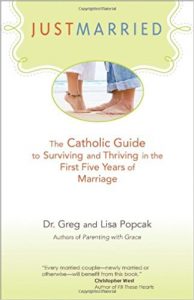Just Married: The Catholic Guide to Surviving and Thriving in the First Five Years of Marriage
by Gregory and Lisa Popcak
 “Most people think of a marriage or family as something they have (like any other possession or acquisition), but it’s much more than that,” Gregory and Lisa Popcak write in “Just Married,” their new and very worthwhile “Catholic guide to surviving and thriving in the first five years of marriage.”
“Most people think of a marriage or family as something they have (like any other possession or acquisition), but it’s much more than that,” Gregory and Lisa Popcak write in “Just Married,” their new and very worthwhile “Catholic guide to surviving and thriving in the first five years of marriage.”
The Popcaks want couples to regard marriage “as an actual activity, an activity that requires time, energy, and practice.” In fact, their book includes an exercise to help a wife and husband estimate how many hours they need to invest in their marriage per week in order “to properly maintain it.”
The authors caution recently married couples against believing that great marriages are “the result of good fortune or other accidents.” Actually, they insist, “couples in great marriages simply practice certain skills and habits” that other couples do not.
The Popcaks are known to many as hosts of Catholic radio and TV series. He is executive director and she vice president of Pastoral Solutions Institute, which, its website states, is “dedicated to providing the resources religiously committed Catholics need to live more faithful and abundant marriage, family and personal lives.”
Earlier books from the Popcak household include “Parenting With Grace,” “For Better … Forever!” and “Holy Sex!” The latter title also serves as a chapter heading in “Just Married.”
“Too many couples think that being married means settling for less love, less passion, less joy, less intimacy. It doesn’t, and don’t listen to anyone who tells you otherwise,” the Popcaks tell newly married couples.
According to the “theology of the body,” the authors explain, “the ache in your heart for a free, total, faithful, fruitful love in and out of the bedroom has been given to you by God as a promise that he wants to fulfill, not just in the next life but in your marriage today.”
The Popcaks consider it unsurprising that couples in the early years of marriage “tend to have a lot of questions about sex.” These authors call marriage “the sacrament of sexuality.”
“A sacrament,” they write “takes something common (water, bread, a man, a woman) and transforms it into a sign that conveys grace to help the people who encounter that sign become what God created them to be.”
Habits, attitudes and skills that strengthen marriage are central to the 13 chapters in “Just Married.” Money issues, relationships with in-laws, traits and tools to “help a marriage get off on the right foot from the beginning” are some of the book’s points of focus.
Particularly helpful are its sections dealing with conflict. The authors attempt to steer couples away from the “popular belief that ‘if we were in a good relationship, it wouldn’t be so much hard work.’” That idea constitutes “a seductive lie,” they state.
The book is insightful in drawing a distinction between complaints and criticisms in marriage. A complaint, it says, is one way a spouse calls “attention to a problem” that needs to be addressed. A complaint is “not personal” and is “nonattacking.”
Criticisms, however, “are very personal, usually attacking,” the book continues. Criticism has a way of removing the focus from the problem at hand. Instead, criticism “makes your spouse the problem.”
When criticism develops in a marriage as “the normal, habitual and automatic way you talk to each other,” then it is time for a couple to take steps to change their communication style, the authors make plain. Among other possibilities, these steps might include a Marriage Encounter weekend or “a few sessions of couple’s therapy” with a “trained, marriage-friendly therapist.”
During the early years of a marriage, the Popcaks comment, “even a fair amount” of conflict – “certainly more than you want” – is normal. They view this as a time for learning to handle conflicts respectfully.
Four unwavering commitments lay “the foundation for a great Catholic marriage” and serve as the foundation for “Just Married” too. First is a commitment to “individual and couple prayer.” The Popcaks hope couples will conclude that “if something is worth arguing about, it’s worth praying about even more.”
Second is the commitment to “nurture your love.” A concern for the Popcaks is that “too many couples think that the fires of love kindle themselves.”
The third essential commitment is to “each other,” with “an even stronger commitment to your vows.” Couples should not be frightened by the thought that there will be days when what keeps them “hanging in there” is their “commitment to the marriage itself,” the Popcaks advise. They believe that “every couple experiences this at least briefly,” but that “these times pass and the loving times come back.”
The fourth commitment is to “learn new skills when new challenges come, instead of giving in to a tendency to blame your marriage or spouse for being ‘broken.’”
With that in mind, the Popcaks recommend that couples remember the following “four little words” when they experience a difficult stretch in their relationship: “Never blame your marriage.”
About the reviewer
David Gibson served for more than 37 years on the Catholic News Service editorial staff.
Disclaimer: Book reviews do not imply and are not to be used as official endorsement by the USCCB of the work or those associated with the work. Book reviews are solely intended as a resource regarding publications that might be of interest to For Your Marriage visitors.




